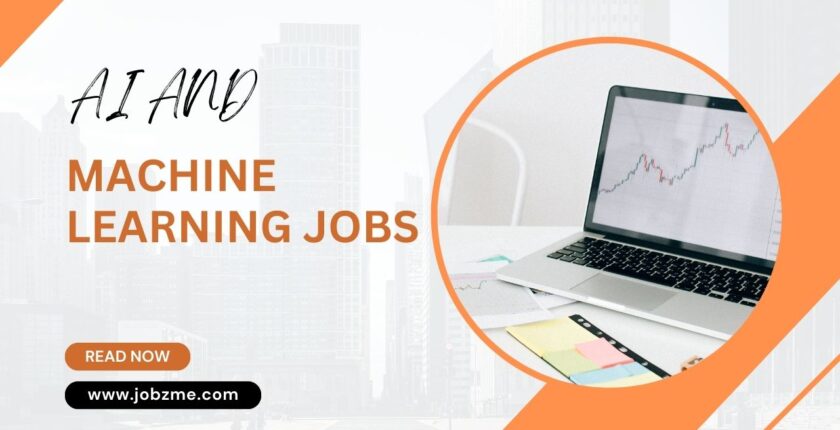AI and Machine Learning Jobs in 2025 – The Future of Work
Artificial intelligence (AI) and machine learning (ML) are no longer futuristic concepts—they are shaping industries, businesses, and careers in real-time. By 2025, the demand for professionals with AI and ML skills will be skyrocketing across technology, healthcare, finance, and even creative industries. Choosing a career in AI today means stepping into one of the fastest-growing and most lucrative career paths in the world.
This guide explores the future of AI and Machine Learning jobs, the top roles available, the essential skills you’ll need, and how you can prepare for this exciting career journey.
Why AI and Machine Learning Jobs Are the Future
AI and ML are fundamentally changing the global economy. From self-driving cars to smart assistants like Siri and Alexa, these technologies are impacting our daily lives. Businesses are leveraging AI for strategic decision-making, fraud detection, customer service, and automation.
Here’s why AI and Machine Learning jobs are so future-proof:
- High Demand: Global industries are desperately hiring talented AI engineers, data scientists, and developers.
- High Pay: AI experts are among the top-paying professionals in the tech industry.
- Diverse Applications: Opportunities exist in healthcare, finance, gaming, robotics, and cybersecurity.
- Impactful Innovation: Working in AI allows you to build solutions that can change the world.
Top AI and Machine Learning Jobs for 2025
1. Machine Learning Engineer
A Machine Learning Engineer designs and deploys the complex algorithms that allow machines to learn from data. It is one of the most sought-after tech roles in 2025.
- Skills Required: Python, R, TensorFlow, Neural Networks.
- Typical Salary Range: $90,000 – $140,000+ annually.
2. AI Engineer
AI Engineers build the intelligent systems that mimic human cognitive functions. They develop the technology behind chatbots, recommendation systems, and automation tools.
- Skills Required: Deep Learning, Programming, and Cloud Computing.
- Typical Salary Range: $100,000 – $150,000+ annually.
3. Data Scientist
Data Scientists interpret and analyze massive datasets to drive business decisions. They are essential to the development of any AI-driven product or strategy.
- Skills Required: Statistics, Data Visualization, SQL, Python.
- Typical Salary Range: $95,000 – $135,000+ annually.
4. Robotics Engineer
Robotics Engineers use AI and ML to create intelligent robots for manufacturing, healthcare, and defense.
- Skills Required: Mechanical Engineering, AI, Automation.
- Typical Salary Range: $80,000 – $120,000+ annually.
5. Natural Language Processing (NLP) Specialist
NLP specialists focus on enabling machines to understand and interact with human language. They are the brains behind voice assistants, translation tools, and advanced chatbots.
- Skills Required: Linguistics, Deep Learning, AI Frameworks.
- Typical Salary Range: $90,000 – $140,000+ annually.
6. Computer Vision Engineer
These engineers build AI systems that can “see” and interpret images or videos. This technology is used in facial recognition, medical imaging, and autonomous vehicles.
- Skills Required: Python, OpenCV, Machine Learning Models.
- Typical Salary Range: $85,000 – $130,000+ annually.
7. AI Research Scientist
These professionals work on advancing the fundamental principles and models of AI. They often work in universities or corporate R&D departments.
- Skills Required: PhD-level expertise, Deep Learning, Algorithms.
- Typical Salary Range: $110,000 – $160,000+ annually.
Frequently Asked Questions (FAQs)
1. Is a career in AI and Machine Learning future-proof? Yes, AI and ML jobs are among the most future-proof career paths. Companies worldwide are investing billions in AI-powered technologies, and this trend is only set to accelerate.
2. Do I need a degree to get a job in AI? While a degree in Computer Science or a related field is helpful, it is not always mandatory. Many successful professionals are self-taught or come from online bootcamps. Today, employers value provable skills and a strong project portfolio more than traditional degrees.
3. Which industries are hiring the most AI experts? AI is not limited to the tech industry. The top sectors hiring AI professionals include IT, Healthcare, Finance, E-commerce, Cybersecurity, and Robotics.
4. Will AI replace all human jobs? No. AI is not expected to replace all human jobs. Instead, it will automate repetitive tasks, allowing humans to focus on roles that require creativity, critical thinking, and emotional intelligence. In fact, AI is creating millions of new jobs that did not exist a decade ago.
5. Is remote work possible for AI and Machine Learning jobs? Yes, remote work is very common for AI and ML roles. Many companies hire AI engineers, data scientists, and researchers remotely, creating global opportunities for talented professionals.
Conclusion
AI and Machine Learning are no longer optional skills—they are the foundation of the future of work. Choosing a career in AI in 2025 means stepping into one of the most rewarding and future-proof fields available. With opportunities spanning every major industry and a growing global demand for talent, now is the perfect time to invest in learning AI skills.
For students, professionals, and entrepreneurs alike, the message is clear: the future belongs to those who can adapt, innovate, and lead in the digital age.

